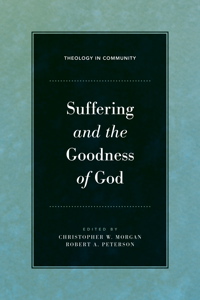The first book in Crossway’s Theology in Community series is Suffering and the Goodness of God edited by Christopher Morgan and Robert Peterson. If this first book is any indicator, Crossway has knocked a home run with a theology series that is both approachable and practical. The question of suffering and the problem of evil are probably near the top of reasons why people reject belief in God. Even for obstinate theists, the problem of evil presents a formiddable challenge.
In Suffering and the Goodness of God the authors meet the challenge with frankness, scholarship and experience. Walter Kaiser writes of suffering in the Old Testament with astute knowledge of the subject matter. John Frame tackles the problem of evil from a theological and philosophical perspective. William Edgar addresses the evils of oppression and slavery in history and in our society today. David Calhoun writes of his experience with cancer and the grace of God that has made itself so evident. And, the last chapter of the book is a moving personal account of John Feinberg’s journey alongside his wife who has Huntington’s Disease.
The questions are often more telling than the answers, but the authors have addressed suffering and evil with a keen eye to the scriptures and a pastor’s heart. How do we see God’s goodness in the midst of pain and suffering? Many of the authors concede that suffering opens our eyes to the goodness of God all around.
Jesus was not blind to suffering himself, but he did not resign to miss the opportunity to teach in the midst of suffering. In the opening chapter, Robert Yarbrough writes:
Jesus did not evade the issue of suffering and neither should we. One day as he was teaching (Luke 13:1–5), he was informed of Pilate’s murder of some Galileans who were in the very act of worshiping God. We do not know all Jesus said. But we know he leveraged the shock of the hour into an object lesson, urging listeners to make a life change. He even took it a step further by pointing to a building collapse that claimed the lives of eighteen people. The lesson he drew from this tragedy was the same: Repent, lest you too perish!
There is much more to say about suffering than “Consider your ways and turn to God!” But Jesus reminds us of that standing imperative. If we dare deepen our comprehension of suffering vis-à-vis God’s goodness—cognizant that “he who increases knowledge increases sorrow” (Eccles.1:18)—we do well to seek ways to emulate Jesus’ acknowledgment of suffering as an occasion for human affirmation of God.
We have already argued that this does not make suffering in itself a good thing (Thesis 1 above). But it does encourage us to enlarge our outlook to incorporate suffering into our view of what it means to come to Christ and then to honor and serve him. We do not trust in him so that we can evade suffering, nor do we present Christ as an assured means of escape from hard times. Rather we trust so that in good times and bad our lives will reflect fidelity to him and the courage that Jesus modeled and imparts. The same suffering that hardens some or drives them to faithless despair can be an occasion for the bold move of hope in Christ in spite of suffering’s disincentives to affirm and believe in God.
We do well to remain intent on enlarging our spiritual understanding so that we become tougher and wiser when it comes to absorbing and responding to suffering. As we do so we will become more effective messengers of the gospel to others whose sufferings may likewise be the occasion of making the right choice when faced with the question: should I let adversity drive me away from the Bible’s testimony to God’s good purposes and eternal promise, or should I believe that the message of Jesus and the cross are still adequate grounds for personal faith in him? It is often suffering that makes this anguished but fruitful outcry unavoidable and that also paves the way for the best, though usually not the easiest, response.
Suffering and the Goodness of God reminds us through biblical exposition, philosophy, theology, and personal experience that suffering, though a part of life, is not the end of the matter. In the midst of our pain God is present. Where is God when we hurt? He is with us as only He can be. I encourage this book as a tool and guide to the suffering and as an aid to pastors who are searching desperately for answers to give to the hurting.



thanks for pointing out this book. as someone keenly interested in this subject, i’m so glad to see conservative evangelicals weighing in on theodicy again. i truly believe suffering is both something that has the attention of everybody and something about which the church has quite a bit to say.
Pingback: Passion For Preaching » Blog Archive » Best of 2008